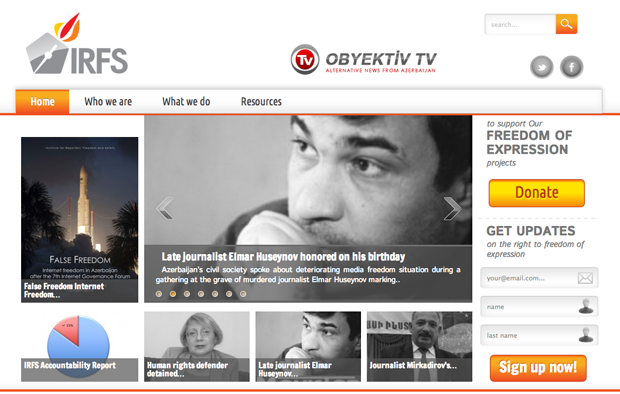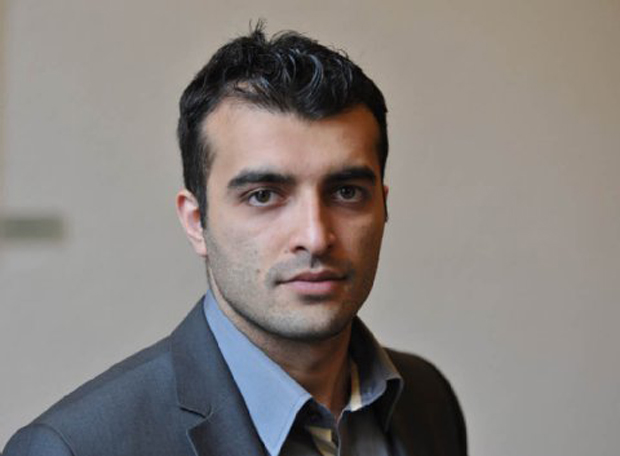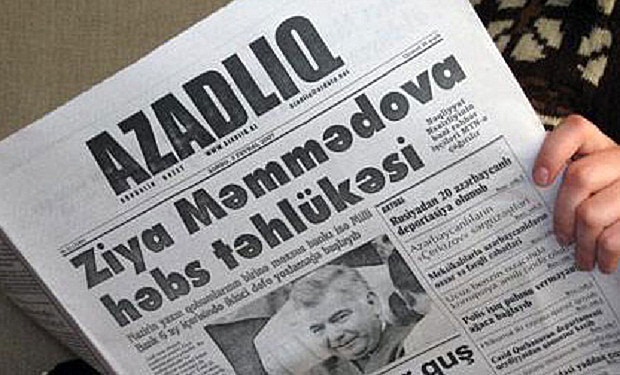8 Aug 2014 | Azerbaijan, Azerbaijan News, Europe and Central Asia, News and features

(Image: IRFS)
The offices of Azerbaijani press freedom organisation Institute for Reporters’ Freedom and Safety (IRFS) were on Friday searched by police – the latest in a new clampdown by authorities on human rights groups in Azerbaijan. Human rights lawyer Intigam Aliyev also had his home searched, and has been sentenced to three months pretrial detention.
The IRSF offices were today surrounded by police officers according to reports from Azerbaijan. There are unconfirmed reports that Emin Huseynov, the head of the organisation, has been detained. He was already under a travel ban.
Over the past two weeks, human right defenders Leyla and Arif Yunus and Rasul Jafarov have been sentenced to three months of pretrial detention, facing charges including high treason, state betrayal and tax evasion. One of the country’s few remaining independent newspapers, Index Award winner Azadliq, has been forced to suspend publication due to financial troubles.
IRFS has been reporting on these and other instances of apparent state targeting of opposition voices. The NGO was founded in 2006, “in response to growing government restrictions on freedom of expression and freedom of press,” according to their mission statement. The latest global press freedom index from Reporters Without Borders ranks Azerbaijan at 160 out of 180 countries, and the recent estimates puts the number of political prisoners in the country at over 140.
The recent cases have taken place against a backdrop of heightening tensions between Azerbaijan and neighbouring Armenia, which so far has left at least 14 people dead. President Aliyev on Thursday published a series of tweets on his personal Twitter account which seemed to threaten war with Armenia. The troubled relationship between the two countries has also played a part in cases against dissidents, including Leyla Yunus who has been accused of spying for Armenia.
In May, Azerbaijan assumed chairmanship of the Council of Europe’s (COE) Committee of Ministers, whose tasks include “ensure[ing] that member states comply with the judgments and certain decisions of the European Court of Human Rights”.
In a statement on Friday, the COE said Secretary General Thorbjørn Jagland has “revealed his deep concern at the arrest of Azerbaijan human rights defender Leyla Yunus and the prosecution case against her husband Arif”.
“By stifling dissent, Azerbaijan is failing to comply with its international obligations which require safeguarding freedom of expression, assembly and association. It is necessary that Azerbaijan reverse the situation,” COE Commissioner for Human Rights Nils Muiznieks has told Azerbaijani media.
Index on Censorship, along with 60 other NGOs, has called for the immediate and unconditional release of Leyla and Arif Yunus and Rasul Jafarov. Today Index reiterates this call and raised its concerns with Britain’s Foreign and Commonwealth Office.
“It is deeply worrying that while international attention is directed at conflicts elsewhere, Azerbaijan appears to be resuming oppression of dissent,” said Jodie Ginsberg, CEO of Index on Censorship. “This is a country showing blatant disregard for human rights while presiding over an institution that describes itself as the continent’s ‘leading human rights organisation.’ The fellow members of the Council of Europe must do more to show Azerbaijan its actions must cease immediately.”
This article was published on August 7, 2014 at indexoncensorship.org
4 Aug 2014 | Azerbaijan, Azerbaijan News, Europe and Central Asia, News and features

(Photo: National Endowment for Democracy)
Azerbaijani human rights activist Rasul Jafarov has been charged with tax evasion, illegal entrepreneurship and power abuse and sentenced to three months of pre-trial detention. Jafarov’s detention follows the arrest last week of Leyla Yunus and the disappearance of the print edition of Azadliq from the streets of Baku. Arif Yunus was put under a three month pretrial detention on 5 Aug.
Jafarov, an Index contributor, is a prominent campaigner and critic of Azerbaijan’s government, led by President Ilham Aliyev. He has worked on putting together a detailed list of the country’s some 140 political prisoners and was one of the organisers behind the Sing for Democracy campaign, in connection with the 2012 Eurovision final in Baku. He was charged with three articles of the Penal Code by Rasul Nasimi district court in the capital Baku, following interrogation at the Prosecutor General’s office. Last week he was handed down a travel ban.
His arrest comes days after fellow human rights defenders Leyla Yunus and her husband Arif were charged with crimes including high treason. Last week, Azadliq, of the country’s few remaining independent newspapers, was also forced to suspend publication of its print edition due to financial troubles. The charges against Jafarov are the same as those that in May saw Anar Mammadli, another prominent human rights defender, sentenced to 5.5 years in prison.
The Institute for Reporters’ Freedom and Safety (IRFS), an Azerbaijani press freedom organisation, said Jafarov’s arrest is “part of a dedicated campaign aimed at suspension of activities of unregistered NGOs in Azerbaijan”. Registering NGOs in Azerbaijan is difficult — Jafarov has reportedly attempted to register his organisation Human Rights Club a number of times without success. As a result, many groups operate without a licence.
There has recently been an escalation in the targeting of opposition voices in Azerbaijan, according to IRFS, who say this crackdown has included state-controlled media smear campaign, raids on NGO offices, confiscation of equipment, suspension of NGO bank accounts, and intimidation and legal pursuit of NGO workers.
In May, Azerbaijan assumed chairmanship of the Council of Europe’s Committee of Ministers, whose tasks include “ensure[ing] that member states comply with the judgments and certain decisions of the European Court of Human Rights”.
“Further deterioration of the situation with fundamental rights and freedoms, as well as repressions against the civil society is incompatible with Azerbaijan’s international commitments, especially in light of its current presidency in the Council of Europe,” said the Civic Solidarity Platform, a network of 60 human rights NGOs of the OSCE region, in a statement.
“We know that the charges against those brave human rights defenders are politically motivated. The authorities want to silence those holding the country to its international obligations and commitments, including within the Council of Europe” said Maria Dahle, Executive Director of the Human Rights House Network.
Index Reports: Locking up free expression: Azerbaijan silences critical voices (Oct 2013) | Running Scared: Azerbaijan’s silenced voices (Mar 2012)
An earlier version of this article stated that Arif Yunus had been arrested last week. This was incorrect. Yunus was arrested on 5 Aug and sentenced to a three month pretrial detention.
This article was posted on August 4, 2014 at indexoncensorship.org
4 Aug 2014 | Awards, Azerbaijan, Azerbaijan News, News and features

Index Award winning Azadliq newspaper was forced into cancelling its print run last week with little hope of restoring its publication.
It is not that easy to get to the editorial office of Azadliq in Baku. Once you enter the building of Azerbaijan Publishing House, a police officer, who sits close to a statue of Heydar Aliyev, the late “father of the nation” and the actual father of the incumbent president Ilham Aliyev, asks you to call the office of the newspaper to get someone to pick you up downstairs. “Everyone in Baku knows their number,” an old lady in the phone room says as she tells me how to reach Azadliq.
Rahim Haciyev, an acting editor of the daily, smiles as he greets me, and leads to the top floor of the building that looks like a shattered remnant of the Soviet past. We pass a dark and neglected corridor that seems to be last painted around 1989 – the year Azadliq was launched.
The last day of July 2014 can become the end of what was the last independent daily in Azerbaijan as it was forced into suspension of publication.
“We owe 20,000 manat (about £15,000) to the publishing house, and they refuse to print our newspaper unless we pay the debt. But we are not able to, because we don’t get money for the newspaper sales. Gasid, the state-owned press distribution company, owes us 70,000 manat (about £53,000), which should be enough to cover our debts and operation costs. Its general manager is an MP and a member of the ruling party – and they just won’t pay us,” says Rahim Haciyev.
The authorities of Azerbaijan have used economic pressure to silence one of the last critical voices in the country. Last year the newspaper was a target of defamation suits that have resulted in £52,000 in fines, which were followed by bans against selling the paper at tube stations and on the streets of Baku. Thus, Azadliq lost sales of 3,500 copies daily – and with the official distribution network refusing to pay for the copies they sell, it has resulted in a complete blockade of any revenue streams. The State Press Support Fund refused to support the paper as well.
“The authorities have tried to stifle us for a long time, and it looks like they have finally succeeded. I don’t see them letting us go back to print. The only chance is strong pressure from the West, but I don’t expect this to happen. The Western democracies are now preoccupied with weakening the influence of Russia in the region, so it is unlikely they are going to put too much pressure on its neighbouring countries,” says Haciyev.
Azadliq’s editor also sees pressuring of the paper as a part of a wider campaign of the Azerbaijani authorities aimed at silencing of the country’s civil society. Two well-known human rights defenders, Leyla Yunus and Rasul Jafarov, were arrested last week; they will be detained pending trial for three months each.
“At the moment, when repressions against the civil society and human rights activists are getting tougher, the last thing they need is a critical newspaper that spreads the word about their clampdown. And we were the last daily that reported on those cases,” Haciyev points out.
Azadliq’s editorial team keeps working, although they have not been paid for two and a half months. The paper’s website, which is one of the most popular news source online in Azerbaijan, is still updated, but nobody knows for how long.
“Azadliq” means “freedom” is Azerbaijani. There is less and less freedom in the country that looks set to take a sad lead on the number of closed down media outlets and human rights activists in jail.
This article was posted on August 4, 2014 at indexoncensorship.org
31 Jul 2014 | Azerbaijan, Azerbaijan News

One of the few remaining independent media outlets in Azerbaijan, the 2014 Index on Censorship Guardian Journalism Award-winning newspaper Azadliq has been forced to suspend publication due to an ongoing financial crisis. This comes just a day after the government of Azerbaijan targeted prominent human rights defenders Leyla and Arif Yunus and Rasul Jafarov. Yunus and her husband have been detained for three months as prosecutors build a case around charges that include high treason. Jafarov has been banned from traveling.
The paper’s Editor-in-Chief Rahim Haciyev told Contact AZ that without an immediate payment of 20,000 manat (£15,105.39) to its printer, the latest issue would not be produced. The paper’s government-backed distributor, which according to Haciyev owes Azadliq 70,000 manat (£52,868.86), has refused. This is not the first time that Azadliq, which has reported on government corruption and cronyism, has faced a financial cliff.
Read more about Azadliq here.
Index Reports: Locking up free expression: Azerbaijan silences critical voices (Oct 2013) | Running Scared: Azerbaijan’s silenced voices (Mar 2012)
This article was posted on July 31, 2014 at indexoncensorship.org



